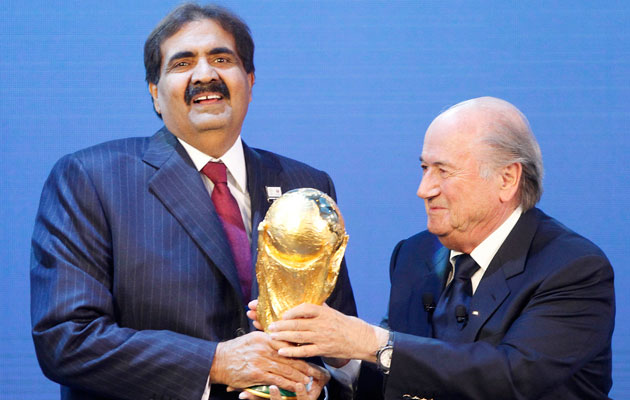The World Cup finals will be staged in Qatar in 2022 in November and December if the FIFA executive committee next month rubber-stamps a recommendation drawn up today by the world federation’s ‘calendar committee.’
But ahead of mid-March a great deal of persuasive talking will go on behind the scenes, aimed mainly at convincing Europe’s leagues – which provide 75pc of the World Cup players and all of the superstars – that slashing a hole in their season is not as commercially and popularly deadly as they fear.
The finals were awarded to Qatar by FIFA’s exco, controversially, in December 2010. Simultaneously Russia was awarded the 2018 finals in a vote which later prompted an inquiry into talk of bidding misconduct.
Allegations of serious wrongdoing have been dismissed by a FIFA ethics investigation led by now-departed American lawyer Michael Garcia.
A proposal for a May World Cup had been put forward by the European Club Association and the European Professional Football Leagues. But this was rejected. The most likely dates would probably be an Opening Match on November 26 with a World Cup Final on December 23.
Playing in January/February was ruled out so as to avoid a clash with the Winter Olympic Games which will be staged in Almaty, Kazakhstan, or Beijing, China.
Initially the Qataris had proposed developing revolutionary air-cooling technology for the stadia, training venues and fan zones. This would have been essential in the traditional June/July slot but would be unnecessary in the Gulf state’s winter.
A major complication is that the finals are usually declared a ‘football-free zone’ throughout the world but many European leagues will wish to continue in televisual and commercial competition. This could create a stage for the ultimate head-to-head confrontation between the club game and the national team football.
A FIFA statement said the other dates were not viable and had the full support of all the six confederations. This means that even the European federation, UEFA, had backed the proposal — against the wishes of its big leagues and richest clubs.
UEFA president Michel Platini had always campaigned for a winter World Cup and had remained relaxed about the disruption both to the domestic leagues and even to the European federations’ own competitions, the Champions League and Europa League.
FIFA’s statement suggested that the disruption could be limited to only one season by switching the 2021 Confederations Cup – the traditional warm-up event – to another Asian nation and staging the 2021 Club World Cup in Qatar as an alternative rehearsal.
Xenophobic howls of outrage from European league football conveniently ignored the fact that most of the rest of the world game runs its season on a spring-to-autumn schedule and has to cope with domestic disruption every four years to allow for the World Cup.






